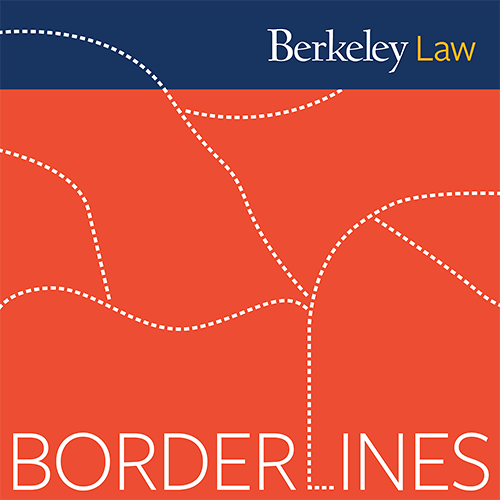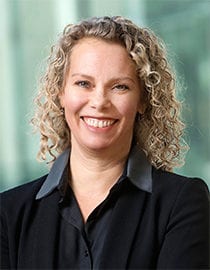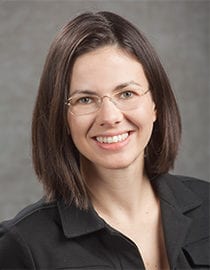By Gwyneth K. Shaw

Berkeley Law’s Honorable G. William and Ariadna Miller Institute for Global Challenges and the Law has always been what Professor and Co-Director Laurel E. Fletcher calls “a convener,” bringing scholars, advocates, and students together to tackle some of the world’s toughest problems.
Amid the COVID-19 pandemic — with in-person travel restricted even as conflicts and problems have flared around the world — a creative push to new platforms is broadening the institute’s audience even more.
Fletcher spearheaded a virtual international symposium in November 2020 examining the future of the international human rights movement. Through a partnership with the online platform Open Global Rights, blog posts from the panelists have just been published, in a collection that offers critiques of and potential paths forward for the movement.
Professor Katerina Linos, the Miller Institute’s other co-director, is also branching into a new arena: podcasting. She recently released the first episode of “Borderlines,” a new series focused on global problems in a world fragmented by national borders.
Linos says these new initiatives are in part a response to the pandemic — noting, for example, that she may never return to the pre-spring 2020 travel schedule for conferences and other face-to-face meetings.
“This is another way to exchange ideas,” she says.
Fletcher agrees. The virtual “Human Rights at a Crossroads?” brought scholars and practitioners across nine time zones into the same conversation, in a way that’s often hard to replicate in real life.
“Oftentimes, we have scholars who are talking to each other, and when practitioners read those pieces, they say, ‘They don’t know what they’re talking about. They’ve never rolled up their sleeves. They don’t know how this really works.’ And when practitioners get together, we often don’t have enough time to puzzle through the big picture. How do we make sense of particular cases and events to identify larger patterns and drivers of change?” Fletcher says.

“And so trying to find that sweet spot where you actually have practitioners and scholars talking to each other, and learning from each other, was a space that I wanted to create. And I thought that the Miller Institute provided the perfect platform to do that.”
Established in 2007, the institute is the heart of Berkeley Law’s international enterprise. Founded and supported with a gift from G. William Miller ’52 and Ariadna Miller, it’s a research, teaching, and policy hub aimed at addressing urgent global challenges through interdisciplinary collaborations and institutional partnerships.
An expert source
Linos says her primary target audience is law professors who are writing and teaching in international law, bringing them expert voices and explainers. The format is drawn from some of her own favorite podcasts: Chats with experts about their field and work.
The first batch of episodes include interviews with UCLA’s Tendayi Achiume, Temple’s Jaya Ramji-Nogales, and Berkeley Law’s Seth Davis on sharing responsibility for refugees. Next, she discusses how worries about multinationals have shifted with Duke’s Rachel Brewster, Chicago’s Adam Chilton, and Berkeley Law’s Stavros Gadinis.
“Once, we worried about multinationals acquiring key assets,” Linos says. “Now, we worry about multinationals controlling our information.”
Another episode on non-binding agreements follows, with Chicago’s Curt Bradley, Harvard’s Jack Goldsmith, and Oona Hathaway of Yale. You can find the podcast on a variety of platforms, including Apple Podcasts and Spotify.

“I’m thinking I can have a multiplier effect,” Linos says. “Imagine there’s a new international tax agreement. Someone might say, ‘It’s really tricky, I don’t know how to teach that, but Katerina has a podcast on that.’
“Maybe they’ll listen, maybe they’ll just assign the podcast as a source. Either way, if you’re curious about international law, this is a place to go to learn.”
That dovetails perfectly with what Fletcher is doing, she says. Fletcher counts students and others interested in the global human rights movement among those who could benefit from the blog series. The entries, which are also available in Spanish, opens up the movement to voices from the Global South as well.
“We’re both bringing together and cross-fertilizing audiences who are interested in international law,” says Fletcher, who also co-directs the school’s International Human Rights Law Clinic and heads its Clinical Program.
“It’s really exciting, because I think that we’re in a moment where we need to have a global human rights movement, and I wanted these voices to speak to that global context.”
Moving ahead
Other upcoming projects will continue to push the work forward. One is expanding an April symposium organized by Davis and Linos about sharing responsibility for refugees, with a particular eye on the political economy of the decisions. The California Law Review, a co-sponsor, will publish a special issue with articles from the participants next year.
Another works in tandem with the Berkeley Law Afghanistan Project, created as the United States’ withdrawal from Afghanistan sparked a humanitarian crisis. The project focuses on providing pro bono legal assistance to help Afghans who need to leave the country — specifically “humanitarian parole” applications for those who don’t meet other visa requirements — and documenting human rights abuses by the Taliban.
Working with the human rights law clinic in the spring semester, the project will help with an empirical legal study of the applications to better understand both who needs help and the conditions that led to the crisis.
“We want to help shift the narrative and offer a greater understanding of who are the Afghans who need to leave the country and why,” Fletcher says. “It’s also helping to answer Katerina’s question, which is who shares responsibility? It’s an urgent question, and this is really going from ideas to action, which is what we try to do here at the Miller Institute.”